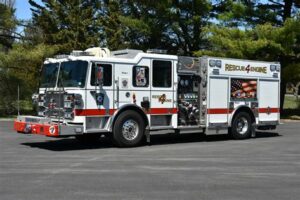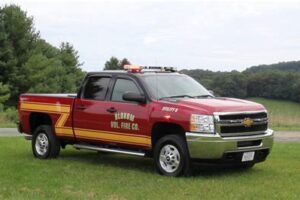Table of Contents
Volunteer Fire Departments play a crucial role in ensuring public safety and protecting communities. Comprised of dedicated individuals who selflessly give their time, these departments provide emergency response services, including fire suppression, rescue operations, and medical assistance. Learn more about the vital contributions and challenges faced by these brave volunteers.
Volunteer Fire Departments: the unsung heroes of our communities, ready to brave the flames and save lives at a moment’s notice. Amidst the chaos and uncertainty, they stand tall, undeterred by the dangers that lie ahead. From battling raging infernos to rescuing trapped individuals, these brave men and women exemplify the true essence of selflessness and courage. But what drives them to rush towards danger when others flee? How do they manage to coordinate their efforts seamlessly, with little to no resources at their disposal? In this era of rapidly evolving emergencies, Volunteer Fire Departments emerge as the backbone of our firefighting infrastructure, proving that heroes don’t always wear capes – sometimes, they simply wear their hearts on their sleeve.
The Role of Volunteer Fire Departments in Our Communities
When an emergency strikes, we often rely on the swift response and expertise of our local fire departments to keep us safe. These brave men and women put their lives on the line to protect us and our property. While many fire departments are staffed by paid professionals, there is a significant number that relies on the dedication and selflessness of volunteers. In this article, we explore the crucial role played by volunteer fire departments in our communities.
A History of Volunteer Firefighting
The concept of volunteer firefighting can be traced back centuries. In the early days, communities would gather together to form bucket brigades, passing buckets of water from hand to hand to extinguish fires. As cities grew, the need for more organized fire departments arose, leading to the establishment of both paid and volunteer forces. Today, volunteer fire departments remain an integral part of fire protection services in many towns and rural areas.
Training and Recruitment of Volunteers
Volunteer firefighters undergo extensive training to ensure they are prepared to handle the challenges they may face. Many departments provide training in fire suppression techniques, first aid, hazardous materials handling, and rescue operations. This training, along with regular drills and exercises, helps volunteers develop the necessary skills and knowledge to respond effectively to emergencies.
Availability and Response Times
One concern often raised about volunteer fire departments is their ability to respond quickly due to the nature of their staffing. Unlike paid departments, where firefighters are on duty 24/7, volunteers have other jobs and commitments. However, many departments have implemented effective systems to ensure a rapid response. Volunteers often live or work close to the fire station and are equipped with pagers or mobile applications that alert them to emergencies.
Community Involvement and Support
Volunteer fire departments thrive on community involvement and support. These departments rely on donations, grants, and fundraising efforts to cover their operational costs. Additionally, community members play a vital role by serving as volunteer firefighters themselves or assisting with non-firefighting tasks, such as administrative work, maintenance, and fundraising activities.
Cost Savings for Communities
One significant advantage of having a volunteer fire department is the cost savings it provides to communities. Paid fire departments require a substantial budget to cover salaries, benefits, and equipment costs. Volunteer departments, on the other hand, rely on volunteers who donate their time and often use personal protective gear. This cost-effective model allows communities to allocate their resources to other essential services.
Challenges and Limitations
While volunteer fire departments play a crucial role, they also face certain challenges and limitations. Recruitment and retention of volunteers can be difficult, especially in areas with declining populations or where job opportunities are limited. Additionally, maintaining up-to-date equipment and meeting training requirements can be financially demanding for smaller departments.
Mutual Aid and Collaboration
In situations where a volunteer fire department faces a large-scale emergency beyond its capabilities, mutual aid agreements come into play. These agreements allow neighboring departments to provide additional resources and personnel to assist in firefighting efforts. Collaboration between departments ensures that communities receive the necessary support during challenging situations.
Volunteer Firefighters as Community Role Models
Beyond their firefighting duties, volunteer firefighters often serve as role models within their communities. They inspire others with their dedication, bravery, and willingness to help their neighbors in times of need. Many volunteers actively participate in community events and educational programs, spreading awareness about fire safety and prevention.
A Legacy of Service and Sacrifice
Volunteer fire departments have a long-standing legacy of service and sacrifice. These brave men and women willingly put themselves in harm’s way to protect lives and property without expecting anything in return. Their commitment to their communities is commendable and deserves our utmost respect and appreciation.
Support Your Local Volunteer Fire Department
If you’re looking for ways to support your local volunteer fire department, consider becoming a volunteer yourself, attending fundraising events, or making a donation. By supporting these dedicated individuals, you contribute to the safety and well-being of your community.
Volunteer fire departments play a vital role in our communities, providing essential fire protection services with limited resources. Their commitment and selflessness are what make them the backbone of emergency response in many towns and rural areas. Let us recognize and appreciate their invaluable contributions to our safety and well-being.
The Vital Role of Volunteer Fire Departments in Small Communities
The Backbone of Small Town Emergency Services
In small communities across the country, volunteer fire departments serve as the backbone of emergency services. These dedicated men and women selflessly give their time and effort to protect their neighbors and their properties. Without these volunteers, many small towns would be left vulnerable in times of crisis.
Recruitment Challenges and Solutions
Volunteer fire departments often face challenges when it comes to recruitment, as finding individuals willing to commit their time and expertise can be difficult. However, some departments have successfully implemented strategies such as community outreach programs and offering incentives, such as tuition reimbursement or other financial assistance incentives, to attract potential volunteers.
Comprehensive Training Programs
To ensure the effectiveness and safety of the volunteers, many volunteer fire departments offer comprehensive training programs. These programs cover subjects like fire behavior and control, hazardous materials response, and emergency medical services. The willingness of volunteers to undergo intensive training showcases their commitment to serving their community.
The Economic Impact
Aside from providing vital emergency services, volunteer fire departments also have a significant economic impact in their communities. Their presence helps to lower insurance premiums, as the availability of local fire protection reduces risks for homeowners and businesses alike. Additionally, property values are often higher in communities that have a volunteer fire department.
Fundraising and Community Support
Given their reliance on community support, many volunteer fire departments actively engage in fundraising activities to cover operational expenses. They organize events such as pancake breakfasts, car washes, and raffles, encouraging the community to contribute towards their cause. The community’s enthusiastic involvement is a testament to the deep-rooted support and appreciation for these volunteer heroes.
Mutual Aid and Collaboration
Volunteer fire departments often work in collaboration with neighboring departments, ensuring a coordinated response to emergencies. These mutual aid agreements enable departments to pool their resources, including personnel, equipment, and expertise, to effectively address large-scale incidents. Such cooperation exemplifies the camaraderie and unity among the firefighting community.
Retaining Volunteers and Preventing Burnout
Volunteer fire departments need to prioritize volunteer retention and prevent burnout. Implementing programs that recognize and acknowledge volunteers’ efforts, providing mental health and wellness support, and fostering a strong sense of camaraderie can go a long way in ensuring the sustainability of these crucial community organizations.
Facing Emerging Challenges and Evolving Technology
Just like their professional counterparts, volunteer fire departments must adapt to emerging challenges and evolving technology. From battling wildfires exacerbated by climate change to utilizing advanced equipment and software for efficient response, these departments have shown a remarkable ability to stay updated and meet the needs of the changing times.
Volunteer Fire Departments play a vital role in ensuring the safety and well-being of communities across the country. These dedicated individuals selflessly donate their time and effort to protect lives and property, often at great personal sacrifice. From responding to emergency calls to conducting community outreach programs, Volunteer Fire Departments go above and beyond to serve their communities.
Here are some key points to consider when examining the use of journalist voice and tone in reporting on Volunteer Fire Departments:
Objectivity: Journalists should strive to maintain objectivity when reporting on Volunteer Fire Departments. This means presenting information in a fair and unbiased manner, without personal opinions or biases. By doing so, journalists can provide accurate and reliable coverage that informs the public about the work and challenges faced by these departments.
Balance: It is important for journalists to present a balanced view of Volunteer Fire Departments, highlighting both their successes and limitations. This enables the public to form a well-rounded understanding of the issues faced by these departments and the impact they have on their communities. For example, a journalist might highlight the heroic efforts of volunteers during a major fire incident, while also discussing the need for increased funding or training.
Human-interest stories: Journalists can use their voice and tone to bring human-interest stories to light, showcasing the individuals behind the Volunteer Fire Departments. By focusing on the personal experiences, sacrifices, and triumphs of these volunteers, journalists can create a connection between the readers and the subject matter. This approach helps to generate empathy and support for Volunteer Fire Departments within the community.
Informative and educational: Journalists have a responsibility to inform and educate the public about Volunteer Fire Departments. Through clear and concise reporting, they can explain the importance of these departments, their funding sources, and the challenges they face. By providing accurate information, journalists empower readers to make informed decisions about supporting and advocating for Volunteer Fire Departments.
Community engagement: Journalists can use their platform to promote community engagement with Volunteer Fire Departments. This can include highlighting volunteer recruitment drives, fundraising events, or training programs. By actively involving the community, journalists can foster a sense of ownership and solidarity, encouraging individuals to contribute their time, resources, or expertise to support these departments.
In conclusion, when reporting on Volunteer Fire Departments, journalists should employ an objective and balanced voice, while also incorporating human-interest stories that generate empathy and support from the public. By providing informative and educational coverage, journalists can empower readers to actively engage with and support these vital community organizations.
Thank you for taking the time to learn more about Volunteer Fire Departments and the incredible work they do within our communities. These selfless individuals dedicate their time, energy, and sometimes even risk their lives to keep us safe. As we conclude this article, let us reflect on the importance of supporting and recognizing the invaluable role these departments play in our society.
Firstly, it is essential to acknowledge the critical role that Volunteer Fire Departments play in emergency response. They are the first line of defense when disaster strikes, providing immediate assistance and ensuring the safety of our loved ones and our property. These brave men and women are often the unsung heroes who respond to emergencies, such as fires, medical emergencies, and natural disasters, with remarkable speed and efficiency. Without their presence, our communities would be left vulnerable and without the necessary aid when it matters most.
Furthermore, Volunteer Fire Departments foster a strong sense of community and camaraderie. The individuals who volunteer their time to serve in these departments come from diverse backgrounds, united by a shared commitment to serve and protect their neighbors. Through their training and teamwork, these volunteers develop strong bonds that extend beyond the fire station. They become pillars of support within our communities, always ready to lend a helping hand or provide guidance during difficult times. Their dedication goes beyond their call of duty, demonstrating the power of unity and compassion.
Finally, it is crucial to recognize the challenges faced by Volunteer Fire Departments. Despite their unwavering commitment, these departments often struggle with limited resources, funding, and manpower. Many volunteers juggle their responsibilities as firefighters with full-time jobs and family obligations. It is therefore our responsibility as a community to support these departments by advocating for increased funding, volunteering our time, or making donations. By doing so, we can ensure that they have the necessary tools and resources to continue their life-saving work.
In conclusion, Volunteer Fire Departments are the backbone of our communities, providing crucial emergency response services and fostering a strong sense of unity. Their unwavering dedication should not go unnoticed or unsupported. Let us remember to express our gratitude, offer our assistance, and advocate for their needs. Together, we can ensure that these remarkable individuals continue to serve and protect us, making our communities safer and stronger.
.
People Also Ask about Volunteer Fire Departments:
What is a volunteer fire department?
A volunteer fire department is an organization made up of community members who volunteer their time and services to respond to fire emergencies and provide firefighting and rescue services in their local area. These departments are typically composed of dedicated individuals who receive training and are on call to assist during fires, medical emergencies, and other related incidents.
How do volunteer fire departments work?
Volunteer fire departments operate by relying on the commitment and availability of their volunteer members. These departments are often funded by local government bodies or through community fundraising efforts. Volunteers undergo extensive training to acquire the necessary skills and knowledge to effectively respond to emergencies. When a call for assistance comes in, volunteers quickly assemble at the fire station and respond to the incident using the department’s equipment and vehicles.
Why do people join volunteer fire departments?
Many individuals choose to join volunteer fire departments out of a strong sense of community service and a desire to help others in times of crisis. The opportunity to learn valuable life-saving skills, work as part of a close-knit team, and contribute to the safety and well-being of their community are also significant motivating factors. Some volunteers may have a personal connection to the fire service or simply feel a calling to serve in this capacity.
Do volunteer firefighters get paid?
No, volunteer firefighters do not receive monetary compensation for their services. They willingly donate their time and expertise to support their community’s fire and rescue needs. However, in some cases, they may receive certain benefits such as insurance coverage, retirement plans, or small stipends to offset expenses related to their service.
Can volunteer firefighters respond to any emergency?
Yes, volunteer firefighters are trained to handle a variety of emergencies, including fires, medical incidents, hazardous material spills, and natural disasters. They undergo rigorous training programs that equip them with the necessary skills to respond safely and effectively to different situations. However, it’s important to note that the level of expertise and resources available may vary based on the size and capabilities of the volunteer fire department.
Remember, volunteer firefighters play an essential role in safeguarding communities and providing crucial emergency services. Their selfless dedication and commitment deserve our utmost respect and support.






